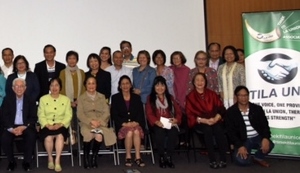Such words of reaffirmation as “Please forgive me”; “I forgive you”; “I love you”; “Thank you”, “Goodbye,” are very important both to the dying people and the persons attending to them themselves, said multi-awarded Filipino-American nurse Remedios Alvarez-Solarte, RN, NP, Professor Emeritus of Nursing from Michigan, USA.
Alvarez-Solarte who is founding member of the Philippine Nursing Association of America (PNAA), was the guest speaker of a “End of Life” seminar held last April 24 in Western ydney under the auspices of the community organisation Tiek Iti La Union Association (TILAUNA) based in Western Sydney. She is also an inducted member of the Far Eastern University Institute of Nursing Hall of Fame.
TILAUNA is headed by Blacktown general practitioner Dr. Cora Francisco.
Alvarez-Solarte said death statistics worldwide showed that the two most common causes of death are coronary artery disease and stroke/cerebrovascular diseases.
What are termed as Illness and dying trajectories were discussed including the disparity between the way people die and the way they want to die in the perspective of patient or perspective of the family.
Alvarez-Solarte said most adults prefer to be cared for at home if terminally ill and majority would be interested in a comprehensive program of end of life care such as a palliative care unit or a nursing home.
Alvarez-Solarted added that quality of life dimensions encompass the physical, psychological, social and spiritual dimensions of a person. Physical includes functional ability, strength and fatigue, sleep and rest, nausea, constipation and pain.
As to psychological dimensions, the issues include anxiety, depression, enjoyment, leisure, pain, distress, happiness, fear, cognition and attention. Social dimensions are the financial burden, care giver burden, roles and relationships, affection/sexual function and appearance. Spiritual includes hope, suffering, meaning of pain, religiosity and transcendence.
The dying experience impacts all dimensions. It can differ from person to person and can only be defined by the patient based on their own life experiences.








Leave a Reply